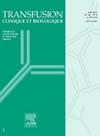在MBBS实习生中设计和评估以能力为基础的输血医学培训计划的影响。
IF 1.2
4区 医学
Q4 HEMATOLOGY
引用次数: 0
摘要
导读:输血医学教育已被广泛认为是加强输血医学教育的迫切需要,以提高患者的安全。为此,印度国家医学委员会(NMC)于2019年为该国所有医学院的本科MBBS学生实施了基于能力的医学教育(CBME)框架。本研究旨在评估为医学实习生设计的培训计划的影响,该计划是根据国家医学中心规定的CBME课程制定的。材料和方法:这是一项基于问卷的横断面研究,在一家三级护理教学医院的不同部门接受轮转培训的MBBS实习生中进行。组织了一个为期两天的结构化教育项目,包括六个模块,三个侧重于床边输血实践,三个涉及献血和基于实验室的输血医学。每个模块的设计都反映了CBME课程中概述的能力,并包括培训前和培训后评估,以评估知识的改进。通过前测来评估参与者的输血医学知识,后测来评估培训计划的影响。结果:总体而言,本研究的前测得分为14.1分(47%),后测得分为22.3分(77.6%)。对前测成绩的分析显示,80%的实习生对输血反应及其管理知识较弱。55.6%的实习生对血液成分治疗指征知识薄弱,32.2%的实习生对床边输血医学实务知识薄弱。73.3%的实习生对献血者的选择和咨询知识较弱。62.3%的实习生和73.3%的实习生对输血传播感染和各种血液成分的相容性检测、储存条件等基础血库知识的了解较弱。训练后的结果显示所有领域都有显著的改善。使用Cohen's d进行的效应量分析表明,该培训计划在六个领域中的五个领域非常有效,在免疫血液学领域观察到中等效果。结论:输血医学知识在核心内科和外科专业的日常实践中是必不可少的,但在实习医师中存在着很大的知识缺口。本研究表明,一个结构化的CBME项目是提高MBBS实习生输血医学知识的有效策略。本文章由计算机程序翻译,如有差异,请以英文原文为准。
Designing and assessing the impact of a competency-based training program in transfusion medicine among MBBS interns
Introduction
It has been widely recognized that there is a pressing need to strengthen transfusion medicine education for both undergraduate and postgraduate medical trainees across various clinical specialties to enhance patient safety. In response to this, the National Medical Commission (NMC) of India implemented a competency-based medical education (CBME) framework in 2019 for undergraduate MBBS students across all medical colleges in the country. The present study aimed to assess the impact of a training program designed for medical interns, developed in alignment with the CBME curriculum prescribed by the NMC.
Materials and methods
This was a questionnaire-based cross-sectional study conducted among MBBS interns undergoing rotatory training in different departments of a tertiary care teaching hospital. A structured two-day educational program was organized, comprising six modules—three focusing on bedside transfusion practices and three addressing blood donation and laboratory-based transfusion medicine. Each module was designed to reflect the competencies outlined in the CBME curriculum and included pre- and post-training assessments to evaluate knowledge improvement. A pre-test was conducted to assess the knowledge of transfusion medicine among the participants and the post-test was conducted to assess the impact of the training program.
Results
Overall, the pre-test score in the present study was 14.1 (47%) which increased to 22.3 (77.6%) in the post-test. Analysis of the pre-test scores showed that 80% of the interns had weak knowledge of blood transfusion reactions and its management. 55.6% of the interns had weak knowledge of indications of blood component therapy whereas 32.2% of the interns had weak knowledge of bedside transfusion medicine practices. 73.3% of the interns had weak knowledge of blood donor selection and counselling. 62.3% of the interns and 73.3% of the interns had weak knowledge of transfusion transmitted infections and basic blood banking including compatibility testing and storage conditions for various blood components, respectively. Post-training results showed a significant improvement across all domains. Effect size analysis using Cohen’s d indicated that the training program was highly effective in five out of six domains, with moderate effectiveness observed in the domain of immunohematology.
Conclusion
Although transfusion medicine knowledge is essential for routine practice in core medical and surgical specialties, a substantial knowledge gap exists among medical interns. This study demonstrates that a structured, CBME program is an effective strategy to improve transfusion medicine knowledge among MBBS interns.
求助全文
通过发布文献求助,成功后即可免费获取论文全文。
去求助
来源期刊
CiteScore
2.50
自引率
11.80%
发文量
234
审稿时长
36 days
期刊介绍:
Transfusion Clinique et Biologique, the official journal of the French Society of Blood Transfusion (SFTS):
- an aid to training, at a European level
- the only French journal indexed in the hematology and immunology sections of Current Contents
Transfusion Clinique et Biologique spans fundamental research and everyday practice, with articles coming from both sides. Articles, reviews, case reports, letters to the editor and editorials are published in 4 editions a year, in French or in English, covering all scientific and medical aspects of transfusion: immunology, hematology, infectious diseases, genetics, molecular biology, etc. And finally, a convivial cross-disciplinary section on training and information offers practical updates.
Readership:
"Transfusers" are many and various: anesthetists, biologists, hematologists, and blood-bank, ICU and mobile emergency specialists...

 求助内容:
求助内容: 应助结果提醒方式:
应助结果提醒方式:


